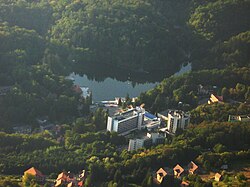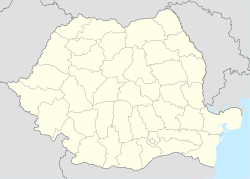Sovata
Sovata
Szováta | |
|---|---|
Town | |
 | |
| Coordinates: 46°35′46″N 25°4′28″E / 46.59611°N 25.07444°E | |
| Country | |
| County | Mureș County |
| Status | Town |
| Government | |
| • Mayor | Ferenc Péter (Democratic Union of Hungarians in Romania) |
| Population (2011) | |
| • Total | 10,385 |
| Ethnicity | |
| • Hungarians | 89.4% |
| • Romanians | 8.5% |
| Time zone | UTC+2 (EET) |
| • Summer (DST) | UTC+3 (EEST) |
| Climate | Dfb |
Sovata (Romanian pronunciation: [soˈvata]; Hungarian: Szováta; Hungarian pronunciation: [ˈsovaːtɒ]) is a town in Mureș County, central Romania.
History

Sovata is part of the Székely Land region of the historical Transylvania province. The first data about Sovata are from 1578. By 1583 it was already a village.
For 42 years, from 1876 until 1918, the village belonged to the Maros-Torda County of the Austrian-Hungarian Empire.
Due to its salty lakes and warm water it became an increasingly popular health resort during the end of the 19th and the 20th century. It gained the status of town in 1952.
Demographics
According to the 2011 census the town had a population of 10,385 of which 89.4% were Hungarians, 8.5% Romanians and 2% Roma.[1]
Demographic movement according to census data:

Geography
Sovata is situated between the Corund River and the valley of the Târnava Mică River. It can be reached from Târgu-Mureş, Miercurea-Ciuc and Odorheiu Secuiesc on the 13A main road and from Reghin on a connection road. Coordinates: 46°35'37.59"N / 25°4'31.96"E
Three villages are administered by the town:
- Căpeți / Kopac
- Ilieși / Illyésmező
- Săcădat / Szakadát
- In 2004, the village of Sărăteni broke away to form an independent commune.
Spa
The geological events in 1875 gave birth to the Bear Lake, which is unique in Europe, its water being helio-thermal and salty, with purported therapeutic effects for chronic gynecological symptoms, severe rheumatic pains, peripheral nervous system and post-accidental motor diseases.[citation needed]
There are four more salty lakes: Nut Lake, Black Lake, Red Lake and Green Lake. In the interwar period, Sovata became one of the most fashionable spas in the country, visited several times even by the Romanian Royal Family.[citation needed]

See also
References
- ^ 2011 census data Archived 2013-11-26 at the Wayback Machine



